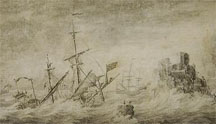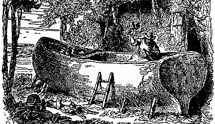A Brief History of Null Island
The world has only recently become aware of Null Island. "How can this be so?", you may wonder. To understand our centuries of isolation, consider the people who settled here.
Africans are not seafaring people. So how did they come to live on a small Island almost 1600 kilometres to the west of modern day Gabon? Most experts believe that it was a result of luck: both good and bad. Perhaps some of our ancestors stood on a beach, looked west and wondered what lay across the water. Perhaps they constructed simple craft and committed themselves to the mercy of the winds and tides. Perhaps they were simply inattentive and were washed off the rocks during a violent storm. Whatever the reason, a few hardy and lucky people found themselves washed up on Null Island, where they set about building a simple society based on fishing and cultivation of the few edible plants found on the Island.
As the centuries passed, Europeans developed a vast network of shipping routes. Great vessels sailed down the African coast on their way around the Cape of Good Hope. Why did Null Island remain undiscovered by any maritime power? Because most ships traveled within sight of land, not 1600 kilometres offshore!
And so the world moved on, leaving our Island in its wake.
Occasionally, the wild Atlantic would deposit the survivors of some shipwrecked vessel upon our shores. After some early unpleasantness, the sailors were generally welcomed into our society.
It must be said that many of our earliest European ancestors were not the sort of people that were missed when they failed to return home from the sea. Consequently, Null Island remained undiscovered as our newest residents were given up for lost by their former companions.
 Early Null Islanders celebrate the arrival of the first Europeans
Early Null Islanders celebrate the arrival of the first Europeans
 Hardship for some, but a growing population for Null Island!
Hardship for some, but a growing population for Null Island!
 Boat building was unsuccessful due to an utter lack of hardwood on Null Island
Boat building was unsuccessful due to an utter lack of hardwood on Null Island
